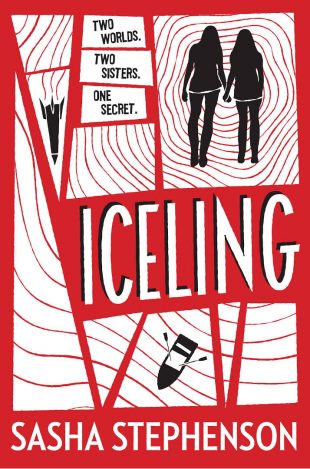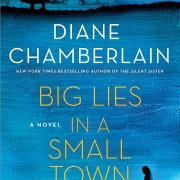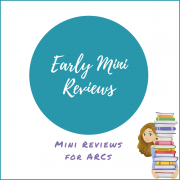ARC Review of Iceling
 Iceling (Icelings #1) by Sasha Stephenson
Iceling (Icelings #1) by Sasha Stephenson 
Series: Icelings #1
Published by Razorbill on December 13th 2016
Genres: Young Adult Fiction, Science Fiction
Pages: 304
Source: First to Read
Amazon
Goodreads
FTC Disclosure: I received a complimentary copy of this book from the publisher via First to Read. All opinions are my own.
Goodreads Synopsis: Lorna’s adopted sister, Callie, is part of a mysterious group of non-lingual teens, Icelings, born on a remote Arctic island, who may not be entirely human. Now Callie wants to go home.
Seventeen-year-old Lorna loves her adoptive sister, Callie. But Callie can’t say “I love you” back. In fact, Callie can’t say anything at all.
Because Callie is an Iceling—one of hundreds of teens who were discovered sixteen years ago on a remote Arctic island, all of them lacking the ability to speak or understand any known human language.
Mysterious and panicked events lead to the two sisters embarking on a journey to the north, and now Lorna starts to see that there’s a lot more to Callie’s origin story than she’d been led to believe. Little does she know what’s in store, and that she’s about to uncover the terrifying secret about who—and what—Callie really is.
* * * * *
My Review:
As a lover of books, it pains me to read a book and not completely fall in love with it. The only thing worse than reading a book and not loving it is to then have to sit down and write a review explaining the lack of love I feel. But that’s unfortunately where I am with Iceling. Let me start by saying that I don’t think I was anywhere near the target age for this book so that should definitely be taking into account if you’re trying to decide if you should give this book a shot.
What I Liked About Iceling:
- Originality: The premise of the story is totally unique. So many books that I read immediately remind me of three or four other books that are similar in storyline or themes. The originality of Iceling’s storyline is what initially drew me to request the book in the first place. I was very intrigued by the idea of this Arctic-born mysterious group of non-lingual teens who may or may not be human. It definitely didn’t sound even remotely close to anything I’ve ever read before.
- Message: I enjoyed the relationship between Iceling Callie and her big sister Lorna. Even though they cannot communicate verbally and Callie demonstrates no signs of even understanding English, Callie and Lorna still share a strong sisterly bond. In fact, Callie is closer to Lorna than she is to anyone else in her family. I thought the author’s message that being family isn’t necessarily about blood was a powerful one. And then she takes it a step further to show, as Lorna even learns at one point, that just because you’re related to someone doesn’t mean they won’t betray you or lie to you.
- Action: Although the beginning half of Iceling moves along at a somewhat slow pace as we get to know Callie and Lorna and start to see what sets Callie apart from everyone else around her, by about the halfway point, the story really takes off and it’s non-stop action from then on out. You’ve got government conspiracies, rogue soldiers, betrayal, explosions, murder, and that’s just the tip of the iceberg (pardon the icy pun!)
Sounds pretty good so far, right? So why didn’t I rate it higher? Well, unfortunately, what I didn’t like about Iceling far outweighed what I enjoyed about it.
What I Disliked About Iceling:
- The Narrator: For much of the novel, we are in Lorna’s head, following her thoughts about everything that is taking place around her – with Callie, her boyfriend, her parents, etc. The problem with it for me was that there were so many long, rambling, and often repetitive internal monologues. I understand wanting to get inside of a character’s head to understand where they’re coming from and that’s usually something that helps me really relate to a main character, but there was just so much rambling that it actually hindered my warming up to Lorna. I didn’t really become invested in her at all until over halfway through the book when she, Callie, and her friends suddenly become underdogs caught up in a major conspiracy.
There was also a tendency by the narrator to over explain things that were fairly self-explanatory, like Lorna and her friend Mimi driving around “dog-calling” boys. A couple of examples of said “dog calling” made it completely apparent that “dog calling” is their version of males and their “cat calling.” I didn’t then need what was basically a textbook definition of “dog callng” to make sure I understood what they were doing. It felt like being spoon fed.
That, on its own, probably wouldn’t have bothered me all that much, but when it was coupled with minimal elaboration on what I considered to be crucial elements of the plot – like, for example, what is going on with Callie and these conniption fits that periodically have her rushed off to the hospital for mystery “treatments” that family members aren’t allowed to witness. Or how about the mysterious adult Iceling they encounter on their journey to the Arctic who pops up out of the ice and then disappears without a trace? Who or what was that? That’s not really something to toss out there and leave hanging with no real explanation or follow up.
- Plot Holes that required too much suspension of belief: I knew by its classification as science fiction that I should expect a few far-fetched events to take place, like the mystery Iceling I just mentioned, but even so, there were just some things that I found a little too hard to swallow.
Now let me say up front that I had issues with Callie and Lorna’s parents leaving them alone for weeks while they traveled to the Galapagos Island. You know your one daughter is prone to these weird fits and sometimes has to go to the hospital, but you’re cool with leaving teenage Lorna in charge. Bad Parenting 101, but okay, fine. Bad parenting happens so I can roll with it.
I also struggled a bit with this journey that Lorna and Callie, accompanied by Stan and his Iceling brother Ted, take north to the Arctic. The trigger for this trip is that both Callie and Ted, even though they were nowhere near each other at the time and had never communicated with one another before, had both simultaneously crafted models of what Lorna and Stan assume is their Arctic homeland. Again, seems a little odd to pile your Icelings in the car and go on a road trip to the Arctic of all places, but again, stranger things have happened, so I was still hanging in there.
What I could not just roll with, however, was the fact that it wasn’t just Lorna and Stan who came to this conclusion. As they get further north, they encounter dozens and dozens of cars containing Icelings, each holding models of the same Arctic island. So, we’re supposed to believe that every single family that had an Iceling simultaneously came up with the same perfect solution to this odd event: ROAD TRIP TO THE ARCTIC!
I can’t say too much more about plot holes without spoiling major elements of the story but there were several other similar plot holes that just left me shaking my head the further I got into the story. Much of the story felt like trying to put together a puzzle that has several missing pieces. You kind of get the whole overall picture, but there are still nagging missing details.
Who Would I Recommend Iceling to?
Even though it wasn’t really for me, I still think it could have the potential to be a great sci-fi read for younger readers. I’m thinking freshmen or sophomores in high school, being much closer to Lorna’s age than I am, might more readily relate to her — and especially to what’s going on in her head – than I could.
My Rating: 2.5 stars








I’m sorry this didn’t work out 🙁 It really sucha a great plot, with such potential too.
Yes, sadly, it was a little disappointing. I do think I would have enjoyed it more if I was a younger reader though so hopefully its target audience will appreciate it more.